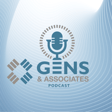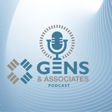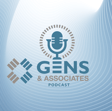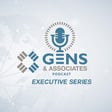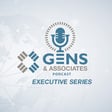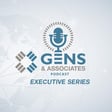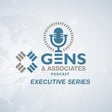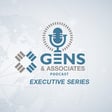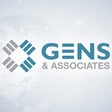Become a Creator today!Start creating today - Share your story with the world!
Start for free
00:00:00
00:00:01

Service Provider Executive Series Episode #8 - Sonia Veluchamy and Punya Abbhi (Celegence)
In today’s episode, host Steve Gens is joined by Celegence’s Sonia Veluchamy (CEO & Co-Founder) and Punya Abbhi (COO & Co-Founder). Together, they discuss their regulatory services and unique tech enabled toolkits, how Regulatory will evolve with AI / Automation, and Celegence’s exciting future!
Transcript
Introduction to Podcast Series
00:00:00
Speaker
Welcome to the Gens & Associates Regulatory Executive Podcast Series. I'm your host, Steve Gens, Managing Partner.
Welcoming Guests: Sonya Balachami and Punya Avi
00:00:07
Speaker
And today I'm excited to welcome the co-founders of Celigence, Sonya Balachami and Punya Avi. So welcome, Sonya, Punya. I always look forward to the founder ah to founder discussions. So it's always a unique situation, in your case, co-founders.
Celigence's Founding and Growth Journey
00:00:26
Speaker
you know starting a con a company from a concept or a sparkle in your eye to where you are today. um And I know as we are prepping with this, I didn't realize you're fairly new in 2017. So where you guys have come and our listeners will hear a lot more about it, it's so it's really impressive. So before we begin, maybe if each of you can do a quick introduction of yourselves and a little bit about selegence and then we'll get going with the conversation.
00:00:57
Speaker
Yeah, thank you so much, Steve. We really are excited to be here today. We've been looking forward to joining you, so thanks for having us. I can start. Sonia Velichami, I'm the CEO and co-founder of Celigence, and I have about almost two decades of experience in the life sciences industry, but really grew up learning about this space. Punya and I are actually sisters, and we launched Celigence at the end of 2017 after having or some experience at ARIS Global.
00:01:26
Speaker
And that actually was our family business.
Tech-Enabled Services and Acquisitions
00:01:28
Speaker
So I was there as the managing director for almost a decade. And so coming from a technology-focused organization, we saw an opportunity to bridge the gap between process and technology by offering this industry tech-enabled services. We were both really passionate about leveraging all the experience that we had gained.
00:01:49
Speaker
to focus on the specific challenges that we saw in the regulatory space. And we always knew that we wanted to find the best areas to incorporate technology to generate efficiency for this industry. We knew companies both small and large still had an opportunity to outsource and to leverage an offshore team, even though this had really been a trend for several years already. So when we initially launched Selegence, we started helping clients navigate some of the evolving regulations like IDMP and MDR. And we quickly started getting more and more traction and providing more sort of comprehensive range of regulatory services to the industry. Specifically, we now currently support companies with regulatory strategy, regulatory intelligence, ah publishing and submissions, bring data services and medical writing. And we were really keen to sort of grow this
00:02:42
Speaker
global strong footprint that was um going to be able to support companies of all sizes. And that was really the reason behind our decision to acquire Qt Dossier back in 2022. So we've been able to leverage that team's expertise across the different service areas that we had already built the prior five years.
00:03:02
Speaker
Thanks,
Role of Technology in Celigence's Success
00:03:03
Speaker
Sonia. I'll introduce myself as well. I'm Punya Abi, COO co-founder at Celigence. Thanks again for having us, Steve. ah My background before starting Celigence was in management consulting, supporting the life sciences industry as well, and various technology implementations and product launches. And then I co-founded with Sonia. And at Celigence, I primarily focus on our technology development where we have three distinct products as well as some internal efficiency tools we use to automate our processes.
00:03:31
Speaker
From the start, we saw that the combination of offering a global talent pool with that onshore offshore model and combining that with technology would really help ease the resource burden faced by this industry. And we're probably one of the only service organizations that actually reinvest almost 10% of our profit into enhancing our technology suite every year. It's a huge part of our our vision and mission. So um one of the products we have, it's called Cactus and it was originally born of the resource challenges we saw on the med tech side. So industry was facing EUMDR and IVDR with this huge burden of documentation. And we started getting assigned clinical evaluation reports, CERs. And this report has to be updated on a regular cadence, depending on the risk profile of the device. So it could be um hundreds of pages long. And we wanted to see which parts of the process of writing that document our team found really burdensome and monotonous and time consuming.
00:04:28
Speaker
So we started with a literature review part of that process and we've grown the system into a general use medical writing platform with so many different modules that streamlined the writing process that includes template management, master data repositories, a reference management system, a way to look at source documents. So the very feature rich platform at this point.
00:04:52
Speaker
And we've been really lucky to have a unique combination of a strong engineering team with the domain expertise. So we always have our writers and our engineers sitting together on workshop and calls together so that ah we really understand the nuances of the process before we build anything. It could be something as simple as the way a medical writer screens articles that give information about the subject device versus the competitive devices. So they might want to set up two different screening criteria.
00:05:21
Speaker
And so knowing the nuances of that process, it's a very specific example, but if you don't have hands-on live experience doing the work, um you can understand the process and pure tech companies do gain it through partnership, um but it's never going to be like that current hands-on and specific information that you get when you're actually currently doing that work for many different clients. And we serve clients with, they might have only one product on the market or they might be a top five manufacturer. so You get such a broad range of experience across multiple therapeutic areas and that kind of make experience and internal collaboration is what makes us so different from other organizations. So it's made our our technology suite particularly useful and and impactful. So that's what I'll add.
00:06:08
Speaker
Well, that's certainly a strong start for our listeners to really understand all the different things that you guys do.
Industry Praise and Market Challenges
00:06:16
Speaker
So a couple of comments before we explore some of the AI automation, and you know, certainly ah Hans van Bruggen, you know, the previous owner of, you know, the Q dossier that you inquired him and I go back, he was actually In 2018, a member of our core research team for the 2018 world class RIM, you probably knew that. So I just wanted to put that out there for our listeners, because you know a small but mighty, you know um high value small organization that you brought into your family, um you know which is great.
00:06:52
Speaker
ah The thing, you know, as we are talking and prepping for this, and and especially given that you just started at the end, let's just say the beginning of 2018 is, it's kind of rare to have excellence in both the biopharmaceutical and med tech. And usually there's a path, you know, even on the software side, you focus on one, maybe eventually you get to the other, but you know, it's rare to find out
00:07:17
Speaker
a service or a tech enabled service provider that actually can do both well. And kind of the things that you're describing, there's so much focus on the whole writing process. And a lot of it gets caught up in the generative AI conversation. ah But a lot of the things about the reference to data, all those things to, well you know, so that that that technology can really be and enabled that you're doing.
00:07:41
Speaker
um The other thing that kind of hit me and you probably see this and I'm just curious that are some of your clients, because there's more and more combination products. So when you have combination products working with those clients and in our big world class room study.
00:07:57
Speaker
um I think it's around 60% of the companies have combination products. So the fact that you're ah really can service us both the the uniqueness of the med tech side and the different things on the the pharmaceutical side. Do you have any comments or, um you know, with your technology or even your clients, you know, that they do combinational products? I'm just kind of curious about that. So it seems you'd be in an interesting position to really help them out. Yes, thank you for that. Actually,
00:08:25
Speaker
That's a good point you brought up. And I was going to mention that ah we actually, our goal was initially to just create a client-centric brand and ensure high quality and repeat business. And we actually started evolving in the medical device space and writing CRS and PMS documents in partnership with a company that had both pharmaceuticals and medical devices. So actually we were writing ccs CCDS documents for their pharma regulatory team and they asked if we could also leverage our offshore team to write their clinical evaluation reports for their medical devices. So it is really fascinating because you have some of these companies that offer ah both you know pharma and med device or they're they've got combination products and they're really looking for the expertise in both the areas and that's what we were seeing as we started the business. And so it was a little bit opportunistic and we were able to gain the experience quite quickly because once we started offering ah these services to the med tech companies, we said that there were more and more companies looking to gain that added regulatory expertise and also potentially you know cut costs through um tech enabled services. so
00:09:38
Speaker
To your point, that market has the combination market specifically has significantly grown. So we'll see as companies come to us for some of the operational matters, they'll also come to us for, you know, support with our strategy when it comes to combination products and understanding how to best position and and enable success with submissions. Punya, is there anything else you would want to add to that?
Platform Enhancements and Innovations
00:10:01
Speaker
I'd like to go into a little more detail about how our tools can support the variety of service offerings, like published publishing automation and medical writing. and They're also really powerful for industry to benefit from. So we offer them as standalone products or subscriptions, which you also often don't see in a lot of tech enabled service organizations. But one example is DAS Moore, which as you mentioned, Steve, it came from the legacy QDossier. And ah we made a lot of enhancements to that. And there's specifically, I'll give some examples, our search capability, which allows for
00:10:37
Speaker
CMC groups to find and make impact assessments much quicker. So instead of spending two weeks, for example, to find information, they're spending two minutes. If they want to change the flavoring components and figure out ah where a certain product has strawberry flavoring, for example, they can find it instantly now by searching in the submitted dossier. And that's the whole concept. And that was also Hans's vision is unlocking the useful information that already exists in the published dossier.
00:11:06
Speaker
And, um, we've recently made more capabilities in that. So it's not just a viewer supports dossier translations, management of health authority correspondence and document comparisons like CCDS comparisons. And there's also a business use case in that for regulatory intelligence. If you're looking back at, you know, health authority responses and seeing how they were managed in the past for certain products. So.
00:11:30
Speaker
DOSplore, so that's how DOSplore is leveraged by our clients as a ah system in-house for them. But we also use DOSplore to exchange commentary when we're doing publishing and submission work. So unpublished output versions with our clients, we can save a ton of time because um the correspondence just happens within DOSplore itself. And ah we've seen, you know, that can really make a big impact on on time savings.
00:11:58
Speaker
And a lot of times turnaround time, it can be a key reason for a client to have issues with vendors or, you know, they're, they're often on a time crunch. So that's been key. um And when it comes to the document level publishing, but you know, the hyperlinking and bookmarking that has to be done at the PDF level, we actually did an assessment of what was on the market already. So we never want to reinvent the wheel of what's already available, but we did see that the tools that were already available might not work on some of our clients that weren't willing to change their templates or processes. So an off the shelf tool wasn't workable necessarily. So we built some in-house automations using RPA and other tools to make just the publishing whole entire workflow a lot more cost effective. And we passed those cost savings on to our customers. So with that, we're able to meet aggressive timelines and also still keep the cost down, which is
00:12:55
Speaker
surprising for some clients when we first speak to them, but um truly possible. And then I'll just add, you know, lastly, on DocScribe are our ECTD templates. um We've incorporated, again, you know, um dating back to when Hans was, you know, leading Qt Aussie, the lead authoring principles that he instilled, which can really save companies time and improve their content and data quality, reduce maintenance time and facilitate the reusability of the documents. so We actually got ah feedback recently from the FDA that they can even recognize our submissions, the submissions we make with our templates, and they really appreciate the tabular formats, which simplifies their reviews. So when we hear things like that, we think, okay, it's really adding value and it's really making an impact. And the CMC templates in particular, we helped clients submit business critical dossiers to the EMA with very few kuup queries, which was the first for them. so
00:13:54
Speaker
They've seen like significant improvements compared to past submissions using those templates. So we we really ensure that everything we build is purpose-built and truly making impact on the industry.
00:14:06
Speaker
Those are some ah very impressive stats, especially there's so much complexity in CMC. um And just with the impact assessment, you know taking it from weeks to minutes certainly is impressive. And I recall a debate I had with Hans, I think it's two or three years ago, where his view is that if we could have a lot more sophistication in the technology to truly and ah interrogate the dossier,
00:14:32
Speaker
does industry really need these complex registration management systems? you know you're You're always going to still need them, but you know most of the data is actually in the dossier. ah But those are some really impressive stats.
AI and Automation in Regulatory Operations
00:14:46
Speaker
So I'd like to shift gears a little bit um and with the the big conversation with AI automation. And we're just you know literally today, Greg and I are processing all the data from our pulse survey that has predominantly a biopharmaceutical, it has med tech. And I know you guys had participated. You're one of 17 software providers or kind of niche tools that kind of support AI automation. And certainly on the biopharmaceutical side, you know, it's well-documented. We've talked about the the decade of regulatory
00:15:21
Speaker
Even though people call it transformation, we say modernization because it's really it the simplification and consolidation of the system and process layer. It may be different organizational strategies based on the simplification. ah So there's a lot more newer foundation to really apply you know the the more of the modern and advanced technology coming out.
00:15:43
Speaker
um But on the MedTech side, I mean, it's our opinion. We we don't have as much robust style benchmark data that they're kind of starting that modernization process. Certainly, the software profile is very different on the MedTech side where you have RIMSIS, RAGdesk, and NOS playing in their Viva too, which is is very different than on the biopharmaceutical side, you know, kind of almost an equal ah market share with our data on that. but um Can you talk a little bit about how you're helping again both sides? You already ah talked a little bit more of you know about your tools um and especially the the services or ah companies, the impact of AI on the services companies can be pretty dramatic. we had um
00:16:30
Speaker
question that if even if if there's a half-truth about the projection of automation that it's a fundamental change to the service provider especially the ones that do outsourcing because people are talking do we pull it in or we want the benefits of that we're projecting and this is just becoming ah public because we're we're saying what is RegOps in 2030, but we're projecting, and some people my question is a conservative, that 30% of the regulatory activities that RegOps do today will be automated. So so can you speak um just on AI automation on both the pharma, med tech side, what you're bringing to the table or how you advise, because you guys do consulting too, how you advise your clients. Big big topic we have here.
00:17:19
Speaker
Yeah, sure. I can start on that, Steve. Thanks. I think you're right. It's a really interesting time and there's a lot of opportunity. ah And, you know, we have to take advantage of it sooner than later. So I think being in the services and tech space really positions us well for this. I think it's still early days, but we're seeing that the pilots that we're doing both ah within CAPTIS and for our MedTech clients, as well as some of the pilots we're doing with our pharma customers, those are yielding positive results. And I think Pune will go into a little bit more of the detail probably if she can, but I just want to mention that I think a lot of, you know you mentioned you've been surveying tech companies, services companies, and I think it's gonna really be the differentiator in where you've got the hands-on experience. I think for us, you know along with having strong partners,
00:18:15
Speaker
It's really key to have the hands-on experience when trying to create these solutions that work in this space. And obviously there's a ton of different ideas around AI and automation, but it's how, you know, does the talent understand the business process and then how can we apply the technology, understanding the nuances and the pain points and the day-to-day operations. And so with that, we are already taking our team's input and feedback and leveraging that on a real-time basis.
00:18:45
Speaker
as we continue to develop our systems. And um when we look at these sort of like clinical clinical evaluation reports and the other PMS documents, we've already kind of um embedded AI in it already in the lit search piece. Now we're looking at content ah creation and and how can we automate that, you know, specific sections within the CR as well. And I think you're right, it it's going to definitely take away that some of that labor intensive work that the human is doing. But I think ultimately, um it's it's going to be the combination of having both the service and the tech where companies ah pharmaceutical companies will derive value, med tech companies as well. I think those companies want to focus on innovation. right If we can
00:19:33
Speaker
ease that burden of lifecycle management so that our customers can focus on innovations and other top of mind activities. and That's going to provide them with the greatest capability for the future. And I think that that's where this combination of technical expertise and the regulatory like sort of services expertise comes together. So ah really excited about what we're seeing with some of the success with these early on pilots, not at a point, obviously, where we can fully use technology, the human will continue to be in the loop, but we are seeing good success with, um at least on the on the content generation side. I know, Punya, if you wanna speak a little bit further about some of the work that we're doing. Yeah, I think there's a huge excitement around AI and a willingness to spend on pilots to see what can work. And if it's not investing in pilots, it's definitely an appetite to learn. So people are willing to sign up for learning opportunities
00:20:32
Speaker
at least so that's what we're seeing and what we're sponsoring. So to see how other companies are really moving the needle. And a specific example I can give is we're working with a large pharma manufacturer to see what we can automate from their module three documents. And we're already seeing success with the first few documents. So over 80% accuracy in the first draft and even getting closer to 90%. That's at least with some of the documents that are you know taking from multiple source documents and putting them in the right like the information in the right place and the right summary. And it's really kind of amazing when you see it and our clients joke that they might want to rethink their jobs in CNC. Of course, it's just a first draft and the human review is always required. Like Sonya mentioned, you need people to oversee projects and join calls, but there's a huge amount of cost saving that could come out of this. ah We have a client that has hired a review team as a separate group, a separate vendor from their actual writing vendors.
00:21:31
Speaker
because they weren't seeing high quality coming out of their ah primary vendor. So I think like when you hear about that and how much ah cost companies take on for life cycle management, you can really see where this will make it a big impact. And, you know, as I mentioned earlier, we have that engineering prowess and the process expertise. So we can also advise, you know, if a client's not using the optimal template or the optimal submission format, then we think, okay, well,
00:21:59
Speaker
You don't really have to provide all of this information or you could provide it better in tabular formats. We can not only automate, but we can advise on the best way to refine that process as well. So I think that combination is really unique and it's also allowed us to do some small internal proof of concepts at a faster speed. So I'll give an example in the clinical evaluation reports I mentioned earlier, the process of risk mapping. so The writer has to map information from external adverse events to what's in the internal documentation internal risk documentation, um and we were able to see quickly how accurate AI could be at making those assessments.
AI's Role in Regulatory Writing
00:22:39
Speaker
And so we noticed it wasn't, we had it checked by one of our experts and it wasn't accurate enough to push forward into the solution yet but if we provide additional data sets from all of the actual work we're doing we're going to be able to get there soon so.
00:22:54
Speaker
that was within you know the device space. And one more area that we've leveraged AI is in the literature screening process. We can extract data from hundreds of articles at a time. So our tool can now extract the data automatically. um So these writers have to screen through these PDFs and extract all the data to make claims and assessments and things like that. So um now it basically can point to the source of where it pulled the data from in the article.
00:23:23
Speaker
um and the writer can just review it and you know accept it or edit it really quickly. And actually that question about source when you do data extraction with AI was coming up a lot. So can you show us where the AI extracted the data from um so that it's easier to verify? And that influenced last year a huge enhancement we did where we implemented RAG, which is retrieval augmented generation, which a lot of businesses have incorporated into their tools if they're able to.
00:23:52
Speaker
Um, because it improves the quality of the responses. So just kind of, as we build, we kind of ah learn more and more about what's going to be important. And of course, um, verification is so important in this space. So we make sure that the source can be identified, um, easily. So data extraction was a great place to start. and It was a low hanging through, but we're super excited about AI generating content for our teams, the starting point.
00:24:18
Speaker
um So, generating specific sections and I just mentioned, you know, the examples and it's always really helpful to have partners or our own work in the area that we're automating so that we understand the nuances of how those documents are written and what sources they're referencing for what information and what kind of internal knowledge gets baked in because sometimes you'll find information that's not in any of the sources and you kind of have to understand where that information is coming in. so any of those manual things have to be baked into the automation. And now that we've seen that we're able to automate this for a specific product type or customer, opportunity to scale that has become really exciting. And we're doing an assessment now to see which documents are the easiest to automate, which ones are most frequently updated and the most costly to write manually. And those factors will inform the priority for automation. So yeah, we're definitely pretty
00:25:14
Speaker
keen on AI and how it's going to change the space. And I think if we're able to continue leveraging the external LLMs that are improving, you know, so quickly and getting better and upgrading, we're going to be able to see some big improvements in the space. And yeah, we're really excited about it.
00:25:31
Speaker
Yeah, I certainly was so back in industry and I think you both know my heritage was in Johnson & Johnson with Janssen specifically. I'd say ah sign me up, you know, very, very impressive. and And a few reflection points on what you're saying. And and first, I think my listeners have heard this before.
00:25:50
Speaker
that you know having when you have people on staff that are using the tools, then you take the tools to market because there's only, i thinking I've been covering the space for 20 years, maybe four or five, maybe you're the fifth on that. And we call them feedback loops that if you get daily feedback on your product or the product you're developing or the tech toolkit that you're developing,
00:26:13
Speaker
um you know it's It's invaluable versus if you're like a traditional software provider, you know you have your user groups, ah your client check-ins, and those are happening sporadic throughout the year versus just real time. So the acceleration of the accuracy, I mean, if you're getting 90% accuracy, that's very impressive because with our benchmark that's ah soon to be announced in two or three weeks,
00:26:38
Speaker
and We talk about nine baskets of technology, you know ah when will be the tipping point, if it is, and some of the stuff you're talking about, we're seeing the tipping point in 2026. So if you're up to around 90% accuracy, you're just about there, meaning you're on the forefront. So congratulations on that. And the ah the other thing too is we had some questions on the survey, and maybe you might have a comment to see how the It's a sentiment you know question, and I wish I would have asked it in 2023. And twenty three as the you know and we file we like the Gartner hype curve you know on some of the new stuff. yeah So if we think about AI, generative AI you know on that, that there was a lot of fear. What does that mean? Is it going to replace jobs? So we really explore that in detail. um
00:27:28
Speaker
on the survey and have the industry viewpoint and the provider viewpoint of industry. And it's kind of really good news that the sentiment has gone from replacing jobs to being an assistant, right? So it's more that efficiency, productivity, having like the the cases you just mentioned, a writing assistant or a research assistant. Let's get that first version of the CSR. so You know, the professional medical writer will will start on version two, that type of thing. And that's actually really, really exciting. And, you know, certainly. um
00:28:00
Speaker
our top performers in our study, they're always optimizing. 100% of our top performers have data-driven optimization, and some of the toolkits that you're describing are definitely optimization on the writing process and others. You take two weeks here, three weeks there, then all of a sudden it's a substantial increase in either product IV efficiency, maybe even time to agency than time to patient.
00:28:28
Speaker
So congratulations on that. The last question here, boy, the time is flying by. And I rarely get to ask this.
Celigence's Future and Closing Remarks
00:28:35
Speaker
And it's my favorite question, you know, when it's a founder to founder. So um again, you know, you guys had ah You know ideas in your mind of what this could be you know value what niche you could carve out how could be successful there's the first couple of years. um ah Will the business be sustainable and it seems like you just have such a solid foundation of the services the tech that rare combination and.
00:29:01
Speaker
uh, a robust clients on both sides and looking at combination products. So, so the favorite questions, very simple is as founders, what, what excites you, uh, most, you know, going forward near term and long-term. Yeah. Uh, I think it's great question. I, uh, I think we are definitely in a unique and exciting position to make a really big impact in this industry. And I think we really have the industry knowledge.
00:29:30
Speaker
as well as the opportunity to provide both high quality and low cost offerings to our clients. I think historically the perception was that managing the work offshore might not really lend itself to high quality, but we've been able to ah enable cost reduction while keeping the quality high.
00:29:48
Speaker
And that's really been through a few different areas one is obviously the use of technology and we want to see this evolve even further with AI, and um the other is is through this global footprint and enabling, um you know, individuals from different regions, different locations to really interact well with one another so that we could grow the talent pool faster than we would otherwise. So I think ah both these things give us a unique opportunity to make an impact. And the goal is really, like you said, to see where we can ease the burden so that companies can focus on really what's more mattering most of them around innovation and um spending less time on sort of the burden and the
00:30:34
Speaker
overwhelming sort of increasing loads that come with lifecycle maintenance. So it's it's definitely an exciting time and we ah look forward, I guess vision is to continue to grow and gain partners who are interested in ah leveraging AI and seeing what they can do differently going forward and um continue to make progress, right? We mentioned the 80% success, and we want to continue to see that as we look at more and more documents and different types of documents, both across pharma and medical device companies. Yeah, I completely agree. It's a really special time. And just to address what you said earlier around fear that AI is going to take jobs, I think automation and AI can really enhance the workflow and
00:31:20
Speaker
our team has Our internal team has really benefited from using CAPTIS and that's really one of the reasons some of them even feel inclined to stay with our us and it retains and excites our our employees as well because they get to use something that's innovative and makes their day-to-day just easier and and less burdensome. So I personally feel very positive about it. you know I hope that the industry continues to be open-minded about it and it's an industry where so much data and documentation has to be updated constantly. and It really makes it right for harnessing the power of AI. So, um, I think with our unique combination, we're in the right place to take advantage of this special time. And, uh, you know, if the CEO of Nvidia thinks we can train robots to do all sorts of things like cook and we let, we're letting them drive our cars, we, I think we can definitely figure out data and documents. So looking forward to how we can make even more an impact in the coming years.
00:32:17
Speaker
Yeah, and certainly with your examples, just in the CMC and the authoring area, um those those have been kind of plaguing industry for for a very, very long time. So yeah, so congratulations on all this success and the momentum, definitely at the forefront.
00:32:34
Speaker
of this and And I agree, it is exciting times and early days on this. So, you know, I think we all looked in the crystal ball and saying, okay, just all the expertise we have in this space, what is it going to look like in 2030? We always look at five, you know, year clips going forward.
00:32:52
Speaker
I think it's tough because um somebody ah the other day, you kind of use the metaphor of the bullet train with how fast things are going. So but it's also really exciting, exciting times. So with that said, if you can let our listeners know, I'm sure some of them by listening to this might want to get ahold of you. I mean, it's the best way to on LinkedIn, your website, what would you recommend? Yeah, we're both pretty active on LinkedIn, Steve. So um That's a great way to get in touch with us. I can also be reached via email. My email address is just sonyasonia at celigence.com. So it's pretty simple, but definitely excited to hear from from individuals. Thank you. And I'm P-A-B-B-H-I at celigence.com or just feel free to reach out to us through our website. We're always open to discussions and showcasing what we've done in R and&D. So thanks so much Steve for having us.
00:33:47
Speaker
Yes, and listeners, you know how to ah get a hold of us again, some associates, you know, through LinkedIn or the contact page of our website. So once again, thank you so much for the podcast and certainly with all the great things going on, maybe we should do another one maybe in a year, see where we're at.
00:34:07
Speaker
where the, you know, after 2005 is done and, you know, what what what are you seeing next? So well congratulations again on a fairly new company, but very successful. So really appreciate it, your time. Thank you. Thanks so much, Steve. We really appreciate the opportunity to be here today. Thanks, Steve.
